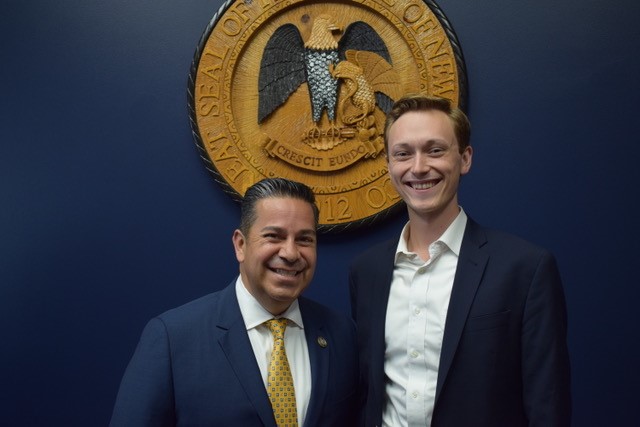
Internship Q&A: Energy Policy on Capitol Hill
Tomas Wesley Green, now a second year TPP student, spent the summer interning on Capitol Hill with Assistant Speaker of the House Ben Ray Luján. Tomas, who researches carbon pricing, shared some reflections of the valuable firsthand experience he gained dealing with energy and climate policy. His internship was supported by TPP’s Internship Fund.
Describe your current research.
At MIT, I work on the recently-launched Roosevelt Project, an ambitious multi-year study led by former Energy Secretary Ernest Moniz on climate change policy and economic transition in the US. The goal of the project is to lay out a path and policy options for decarbonization that will be an equitable and just transition. My thesis will examine carbon pricing policy and the trade-offs between equity and efficiency. A carbon tax is typically regarded as the most efficient way to reduce emissions, as compared to a regulatory approach. However, carbon taxes can be regressive because lower-income households spend a larger fraction of their income on energy. My research will address this tension by examining different policy-design instruments to understand how a carbon tax policy would affect households across different economic profiles.
Tell us about the internship: where did you work, and what did you do?
This summer, I served as a legislative fellow for Assistant Speaker of the House, Ben Ray Luján. Representative Luján is appointed to the Select Committee for the Climate Crisis and to the Committee on Energy and Commerce, and has pursued a broad energy and climate agenda. While interning with Rep. Luján, I learned how variable the work in Congress is to the political opportunity of the time.
Energy innovation and technology transfer is an area that Republicans and Democrats can agree on, and that is what our office chose to focus on. As the National Defense Authorization Act (NDAA) was moving through committee, we saw a chance to push for expanding the DOE’s Lab-Embedded Entrepreneurs Program to defense-oriented labs, such as the Los Alamos National Lab that is in Rep. Luján’s district.
I drafted an amendment and worked with legislative counsel to prepare the legislative text to be introduced on the House floor. The amendment and the NDAA passed the House, and we worked to get the same amendment included in the Senate version of the NDAA.
Other work this summer included preparing for hearings by researching policy issues, reading testimony, and drafting remarks and questions. For one of the Select Committee hearings I worked on, I staffed Rep. Luján in the hearing. Another significant project I contributed to was the reintroduction of the IMPACT for Energy Act, a bill that will establish a nonprofit foundation for the DOE. Using my Cambridge ties, I secured an endorsement letter from Greentown Labs, the largest clean tech incubator in the US. Rep. Luján is pushing to advance the bill and we are hoping it will be included in a larger energy innovation package that will be on the House floor in September. In my role, I also helped with traditional intern duties by answering phones, managing constituent correspondence, and giving Capitol tours.
How does the internship connect to your current research and future plans?
This summer gave me a better sense for the diversity of ways Congress wants to address climate change. Without a clear plan from either party, there will be many alternatives proposed. I will try to use some of these policy ideas to inform my thesis and examine the trade-offs between a carbon tax and other legislative instruments. This summer can also lead to an ongoing collaboration between MIT and New Mexico. The Roosevelt Project is considering using New Mexico as a case study, as they have ambitious renewable energy targets, but also a robust fossil fuel industry. Furthermore, some native nations in New Mexico rely on coal and natural gas as the cornerstone of their economy. The transition will prove to be a complex challenge for both technology and policy.
My experience, generously made possible through TPP, confirmed that I would like to head to DC after graduation and spend more time on Capitol Hill. Working in Congress can accelerate my career and give me diverse experience in energy and climate policy.



